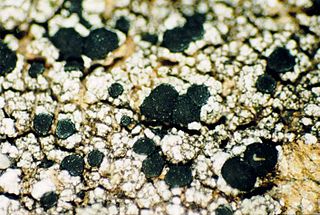
Alders are trees comprising the genus Alnus in the birch family Betulaceae. The genus comprises about 35 species of monoecious trees and shrubs, a few reaching a large size, distributed throughout the north temperate zone with a few species extending into Central America, as well as the northern and southern Andes.

Alnus incana, the grey alder or speckled alder, is a species of multi-stemmed, shrubby tree in the birch family, with a wide range across the cooler parts of the Northern Hemisphere. Tolerant of wetter soils, it can slowly spread with runners and is a common sight in swamps and wetlands. It is easily distinguished by its small cones, speckled bark and broad leaves.
Viktor Ferdinand Brotherus, Finnish botanist who studied the mosses (Bryophyta), best known for authoring the treatment of 'Musci' in Engler and Prantl's Die Naturlichen Pflanzenfamilien.

The Lecanoraceae are a family of lichenized fungi in the order Lecanorales. Species of this family have a widespread distribution.

The following outline provides an overview of and topical guide to lichens.



